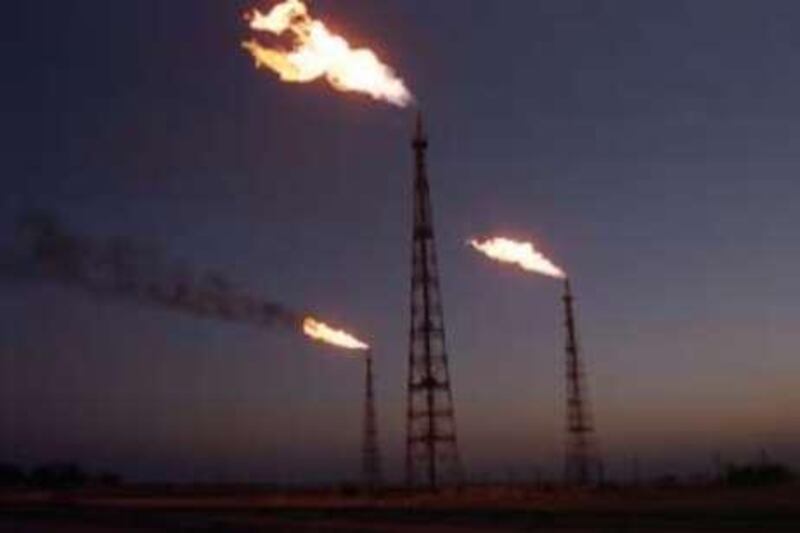UNITED NATIONS // A Caribbean plan to bail out cash-strapped economies from the effect of soaring crude prices with a "global solidarity fund" has met with a lukewarm response from the Middle East's oil producers. Carlos Morales Troncoso, the foreign minister of the Dominican Republic, has unveiled plans for oil exporters to share their windfall through a system of low-cost loans, investment and development assistance.
But crude producers from the Middle East, including Iran and Algeria, said their governments were already providing generous quantities of aid and assistance, and argued that rising oil prices were not to blame for the world's economic woes. Speaking at the UN headquarters in New York, Mr Troncoso said oil prices, which rocketed to recent highs of about US$148 (Dh543) per barrel from an average of about $60 in 2007, were disproportionately hitting the poorest people in developing countries.
"We are poor nations, and it is impossible to adjust our economies to these difficulties, which are beyond our financial capacity," Mr Troncoso said. "The price of oil is affecting every area of the production chain. "The most seriously affected sectors are electricity generation, transportation and food production. Our nations are really facing almost insurmountable difficulty in handling this situation."
UN agencies warn that oil price hikes have increased the cost of transportation and fertiliser, thereby becoming a major driving force behind the global rise in food prices. While shoppers in wealthy countries suffer higher prices at supermarket checkouts, those in the developing world are struggling to afford basic staples and, in more extreme cases, facing hunger. The tiny western Pacific archipelago of the Marshall Islands recently declared a state of economic emergency because oil price hikes have left power companies unable to afford new shipments. Utility providers were preparing for the possibility of shutting down power stations and leaving the country of about 54,000 people at a standstill.
Jack Ading, the islands' finance minister, said the "intensity and severity" of the global fuel crisis was "more acute and destabilising on small island states like the Marshall Islands, with practically no means to protect itself from external pressures and shocks". Representatives of such developing economies as Nicaragua, Jamaica and Liberia have also said their populations are reeling from food and fuel inflation and desperately need assistance.
Mr Troncoso called needy nations to "join together in a bloc" and approach oil producers for help with the support of statesmen such as Bill Clinton, a former US president, and Kofi Annan, a former UN secretary general. The minister proposed a "global solidarity oil fund" that would see oil producers donate three per cent of their crude incomes into a programme administered by the United Nations. Developing countries would be able to access the cash based upon how much oil they import, and access the fund as a "soft loans, long-term loan or direct investment" in their economies.
The funding scheme emulates the PetroCaribe deal between Venezuela and 18 of its Central American and Caribbean neighbours, which sees the world's fifth largest oil exporter provide 200,000 barrels of crude per day on preferential conditions at flexible credit terms. The project has been running since 2005 and allows beneficiaries to pay for half of their oil supply up front. The remaining half is paid for in a span of 17 to 25 years with a yearly interest of between one per cent and five per cent.
Mr Troncoso said the scheme "would mitigate the impact of the rising oil prices" and enable developing economies to produce and import enough food to meet UN targets on "eradicating hunger and extreme poverty" by 2015. "We need to do this urgently. Each day that goes by the situation seems - at least in our case and probably in yours also - to get worse," he said. But oil producers from the Middle East were quick to pour cold water on the Dominican Republic's proposal, with two of the region's biggest crude exporters highlighting holes in the proposal.
Nor Eddine Benfreha, a counsellor for Algeria's missions to the UN, said oil-rich countries suffered just as badly from the food price crisis as those that imported crude. "There is no direct link between the food crisis and oil prices. The food crisis is the result of ... financial speculation, lack of productivity, lack of investment in the agricultural sector and international trade rules," Mr Benfreha said.
The North African diplomat said rising prices had been exaggerated and should be analysed in line with the inflation of other commodities, adding: "A gallon of cafe latte in New York costs more than a gallon of oil." Ahmed Rayabi, from Iran's UN mission, said crude producers already provided generous assistance through the Organisation for Petroleum Exporting Countries, which has committed US$12 billion to development projects, he said. Tehran's delegate said the global solidarity fund of the Dominican Republic lacked focus. "I hope that this initiative, in the future, makes clear what its target and structure is."
@Email:jreinl@thenational.ae







